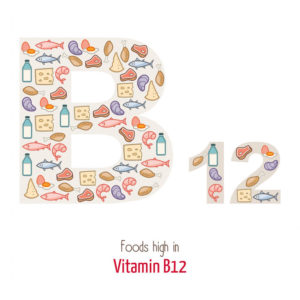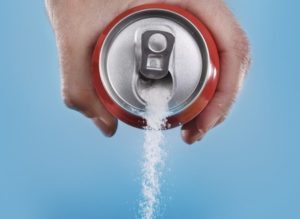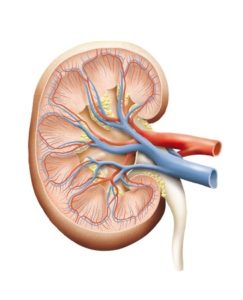Signs You Need More Vitamin B12
 Exhaustion is a sensation that most of us have accepted as a fact of life. Between busy work schedules, demanding social obligations, financial stresses, housework, and everything in between, it’s no mystery why most people drop into bed completely exhausted at the end of the day.
Exhaustion is a sensation that most of us have accepted as a fact of life. Between busy work schedules, demanding social obligations, financial stresses, housework, and everything in between, it’s no mystery why most people drop into bed completely exhausted at the end of the day.
However, you shouldn’t have to cope with this chronic feeling of fatigue. Even with a busy schedule, the right nutrition can help you push through the day with the energy you need. If you find it difficult to maintain your daily tasks, you could be suffering from a vitamin B12 deficiency. B12 plays many vital roles in the body, and without enough of it, the body simply cannot function at the level your schedule requires. Read More


 Suffering from migraines is a serious health problem suffered by 39 million Americans. Migraine symptoms like nausea and throbbing pain actually disable 1 in 5 people who get them. These people are forced to call off from work, cancel plans with friends, and writhe in pain until the migraine finally ends.
Suffering from migraines is a serious health problem suffered by 39 million Americans. Migraine symptoms like nausea and throbbing pain actually disable 1 in 5 people who get them. These people are forced to call off from work, cancel plans with friends, and writhe in pain until the migraine finally ends.  Internal medicine physicians rise to the challenge of caring for patients by providing broad and comprehensive care. Internists specialize in preventing, diagnosing, and treating chronic diseases while also promoting and supporting ongoing health. If you value your health and wellness, don’t overlook the importance of having an internal medicine physician on your side.
Internal medicine physicians rise to the challenge of caring for patients by providing broad and comprehensive care. Internists specialize in preventing, diagnosing, and treating chronic diseases while also promoting and supporting ongoing health. If you value your health and wellness, don’t overlook the importance of having an internal medicine physician on your side.  If your morning, afternoon, or evening isn’t complete without a cup of coffee in your hand, you can breathe a sigh of relief for your health. According to new research, coffee’s health benefits are more extensive than previously thought! It’s possible that your java habit might actually be an asset to your overall wellness. Here’s everything you need to know!
If your morning, afternoon, or evening isn’t complete without a cup of coffee in your hand, you can breathe a sigh of relief for your health. According to new research, coffee’s health benefits are more extensive than previously thought! It’s possible that your java habit might actually be an asset to your overall wellness. Here’s everything you need to know! Nobody doubts the importance of vitamin D to the human body, but scientists recently confirmed it is even more essential than previously believed. Researchers at Ohio University used high-tech nanosensors 1,000 times smaller in diameter than a human hair to assess the impact of vitamin D3 on cardiovascular health. Here is everything that you should know about those findings and the overall importance of vitamin D to your health.
Nobody doubts the importance of vitamin D to the human body, but scientists recently confirmed it is even more essential than previously believed. Researchers at Ohio University used high-tech nanosensors 1,000 times smaller in diameter than a human hair to assess the impact of vitamin D3 on cardiovascular health. Here is everything that you should know about those findings and the overall importance of vitamin D to your health.  Many addictions, like drugs and gambling, are bold and in-your-face. Other addictions, however, are nearly impossible to detect. Would you believe that you might be addicted to sugar? It’s true! Added sugars, such as those found in baked goods and sodas, are dangerous for the body but very difficult to stop eating. If you are still trying to choose a New Year’s resolution, try cutting down on how much sugar you eat in 2018!
Many addictions, like drugs and gambling, are bold and in-your-face. Other addictions, however, are nearly impossible to detect. Would you believe that you might be addicted to sugar? It’s true! Added sugars, such as those found in baked goods and sodas, are dangerous for the body but very difficult to stop eating. If you are still trying to choose a New Year’s resolution, try cutting down on how much sugar you eat in 2018!  Sugar has become Public Enemy Number One in the world of nutrition, leading many consumers to eager select artificial sweeteners in their effort to avoid real sugar. While cutting back on added sugar intake is a worthwhile goal, artificial sweeteners may not be a better alternative! The truth is, artificial sweeteners have dangers lurking beneath the surface, including links to weight gain, diabetes, heart disease, and a number of other health risks.
Sugar has become Public Enemy Number One in the world of nutrition, leading many consumers to eager select artificial sweeteners in their effort to avoid real sugar. While cutting back on added sugar intake is a worthwhile goal, artificial sweeteners may not be a better alternative! The truth is, artificial sweeteners have dangers lurking beneath the surface, including links to weight gain, diabetes, heart disease, and a number of other health risks.  In the beloved 1990s sitcom
In the beloved 1990s sitcom  It would be an understatement to say that Thomas Edison changed the world when he invented the lightbulb in 1879. In reality, he transformed the very way that people live their lives. Rather than going to bed with the sunset and waking with the sunrise, artificial light has made it possible to extend the day for as many hours as we need. Unfortunately, health experts believe that this ability has also created extensive and damaging health effects on the human body.
It would be an understatement to say that Thomas Edison changed the world when he invented the lightbulb in 1879. In reality, he transformed the very way that people live their lives. Rather than going to bed with the sunset and waking with the sunrise, artificial light has made it possible to extend the day for as many hours as we need. Unfortunately, health experts believe that this ability has also created extensive and damaging health effects on the human body.  We live in a world wrought with tension, and unfortunately that stress often culminates into health problems. One of the most common results of this stress is the tension headache, a headache of moderate pain that causes the head to feel like a tight band is being pulled around it. If you know this feeling well, there are steps you can take to alleviate your pain in the future.
We live in a world wrought with tension, and unfortunately that stress often culminates into health problems. One of the most common results of this stress is the tension headache, a headache of moderate pain that causes the head to feel like a tight band is being pulled around it. If you know this feeling well, there are steps you can take to alleviate your pain in the future.